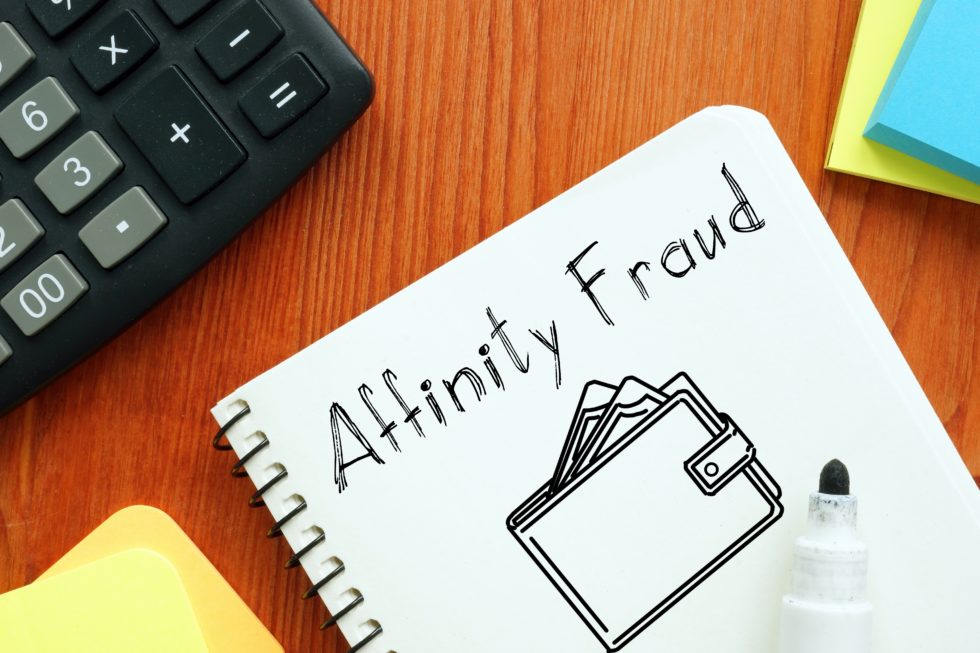“Affinity Fraud” is the latest in a long line of terms used to describe various frauds, and many of the people who use the phrase in social media don’t actually know what it means. To understand affinity fraud, you first have to understand the definitions of “fraud” and “con artist,” both of which I will explain in the following paragraphs. Then I’ll give you some real-life examples of affinity fraud and give you some tools to avoid becoming a victim.
Fraud is a lie.
When asked to define fraud, most lawyers will give you a legalistic definition like:
(www.thelawdictionary.org/fraud/)
Huh?
There is a much simpler definition of fraud: Fraud is a lie. Think about it. You can’t lie by accident, so a lie is by definition intentional. And, the liar lies because they don’t want the hearer to know the truth. A lie is a false statement that is intended to convince the hearer to react differently than they would if they knew the truth.
For the fraud to be successful, the hearer must trust and believe the liar…which brings me to the next definition: con artist
A con artist is an effective liar.
Many criminals use weapons and fear to persuade people to part with their money and belongings. In contrast, a con artist uses words – either spoken or written. The con artist’s greatest skill is being able to lie persuasively and believably so that their victim’s voluntarily give up their money or property. To do this, con artists have to convince people to trust them.
There are numerous words that we use to describe people who have this skill: hustler, swindler, bunco, flimflam man, scammer and more. But, they all describe the same person: a skilled liar.
Affinity Fraud is lying to your own people to cheat them out of money and property.
A con artist must gain their victim’s trust. Otherwise, the victim will not believe the lies and will not succumb to the fraudster’s persuasion.
As a general matter, we are all more likely to trust people who are similar to us, and con artists, who do not feel empathy, take advantage of our trust. They will take advantage of people who share the same social groups, culture, country of origin, language, religion, food, neighborhood, race and more.
Here are some examples from the news and from my legal practice as former white collar criminal prosecutor and trial lawyer:
- A Black man joined 6 Christian Churches with predominantly Black members. He pretended to be a licensed mortgage broker and told his fellow parishioners that he could probably get them better interest rates on their mortgages if they refinanced with him. Many of them filled out loan applications, but he told each of them that he was unable to lock in a better rate. Then, without their knowledge, he committed mortgage fraud to obtain mortgage loans in their names and bought two dozen houses, put tenants in the homes, and collected the rent for himself.
- Bernie Madoff created the biggest Ponzi scheme in history, and according to this article in The Atlantic magazine, he was also a Jewish affinity fraudster. The author wrote: “Madoff’s victims were not a random assortment of the well-off; he decimated a segment of the wealthy Jewish community and several Jewish charitable organizations.”
- A few weeks ago, I wrote an article about man of Haitian descent who preyed on the Haitian community in the NYC area. He persuaded them to give him millions of dollars for what appears to have been investment fraud and cryptocurrency fraud.
How to Protect Yourself from Affinity Fraud?
In my humble opinion, every single person can be a victim of a con artist because we all trust some people in our lives – whether they come from our neighborhood, go to our church, come from the same country, or are old high school friends – and any one of these people could be a complete fraud. I’m sure there are psychological explanations for these people – psychopaths? – but all I know is that they know how to blend into society very well.
(https://www.psychologytoday.com/us/basics/psychopathy)
Having said that, the same psychopath who can scam you probably can’t scam me and vice versa…because we come from different backgrounds and trust different people.
Two key pieces of advice to avoid becoming a victim:
- If it sounds too good to be true, it probably is, so don’t put more money at risk than you can afford to lose.
- Obey the old Russian proverb used by President Reagan in 1987: “Trust but verify.” In other words, do your own due diligence and investigate the details when someone wants your money.

